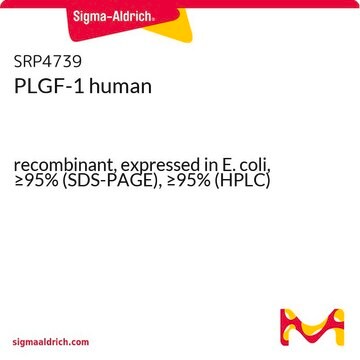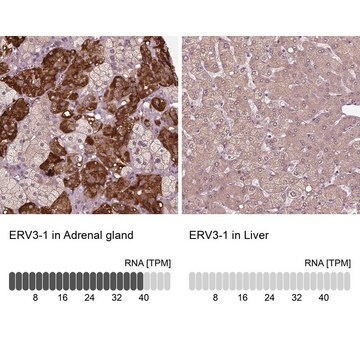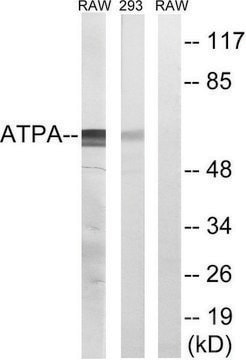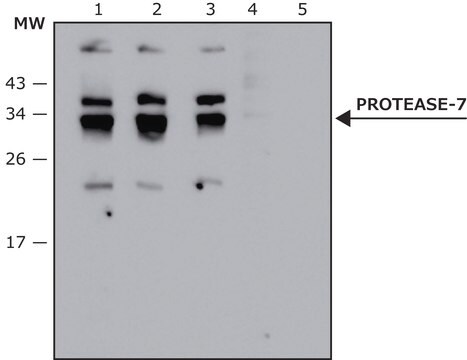SRP4743
PLGF from mouse
recombinant, expressed in E. coli, ≥95% (SDS-PAGE), ≥95% (HPLC)
Synonym(s):
PGF, PIGF
Sign Into View Organizational & Contract Pricing
All Photos(1)
About This Item
Recommended Products
biological source
mouse
recombinant
expressed in E. coli
assay
≥95% (HPLC)
≥95% (SDS-PAGE)
form
lyophilized
mol wt
~32.6 kDa
packaging
pkg of 10 μg
storage condition
avoid repeated freeze/thaw cycles
impurities
endotoxin, tested
NCBI accession no.
shipped in
wet ice
storage temp.
−20°C
Gene Information
mouse ... Pgf(18654)
General description
PLGF (also called Placenta Growth Factor, PIGF, PGF) is an angiogenic factor that belongs to the cysteine-knot superfamily of growth factors. PLGF is expressed in placental tissues, colon and mammary carcinomas. It signals through the VEGFR-1/FLT1 receptor and stimulates endothelial cell proliferation and migration. Recombinant mouse PLGF is a disulfide-linked homodimer containing two 142 amino acid polypeptide chains.
Physical form
Sterile filtered and lyophilized with no additives.
Reconstitution
Centrifuge the vial prior to opening. Avoid freeze-thaw cycles.
Reconstitute the protein in sterile 20 mM acetic acid to a concentration of 0.1-1.0 ug/ul. The solution can then be diluted into other aqueous buffer.
Storage Class
11 - Combustible Solids
wgk_germany
WGK 3
flash_point_f
Not applicable
flash_point_c
Not applicable
Certificates of Analysis (COA)
Search for Certificates of Analysis (COA) by entering the products Lot/Batch Number. Lot and Batch Numbers can be found on a product’s label following the words ‘Lot’ or ‘Batch’.
Already Own This Product?
Find documentation for the products that you have recently purchased in the Document Library.
Changjun He et al.
Cellular physiology and biochemistry : international journal of experimental cellular physiology, biochemistry, and pharmacology, 47(6), 2534-2543 (2018-07-11)
Assistance with tumor-associated vascularization is needed for the growth and invasion of non-small cell lung cancer (NSCLC). Recently, it was shown that placental growth factor (PLGF) expressed by NSCLC cells had a critical role in promoting the metastasis of NSCLC
Zanfeng Wang et al.
Molecular and cellular biochemistry, 439(1-2), 163-169 (2017-09-02)
Vascular endothelial growth factor (VEGF) family members play critical and complex roles in the regulation of cancer vascularization and metastasis. The exact molecular control of lung cancer metastasis by VEGF family members is not completely understood. Here, we showed that
Huaifeng Li et al.
Cancer science, 109(5), 1532-1544 (2018-03-27)
Gallbladder cancer (GBC) is the most common malignant tumor of the biliary tract system. Epithelial-mesenchymal transition (EMT) plays a vital role in the process of tumor metastasis. Mesenchymal-like cells can serve as a source of cancer stem cells, which can
Xu Zhou et al.
Scientific reports, 5, 10071-10071 (2015-05-12)
Cancer neovascularization plays an essential role in the metastasis of larynx carcinoma (LC). However, the underlying molecular mechanisms are not completely understood. Recently, we reported that placental growth factor (PLGF) regulates expression of matrix metalloproteinase 3 (MMP3) through ERK/MAPK signaling
Our team of scientists has experience in all areas of research including Life Science, Material Science, Chemical Synthesis, Chromatography, Analytical and many others.
Contact Technical Service





